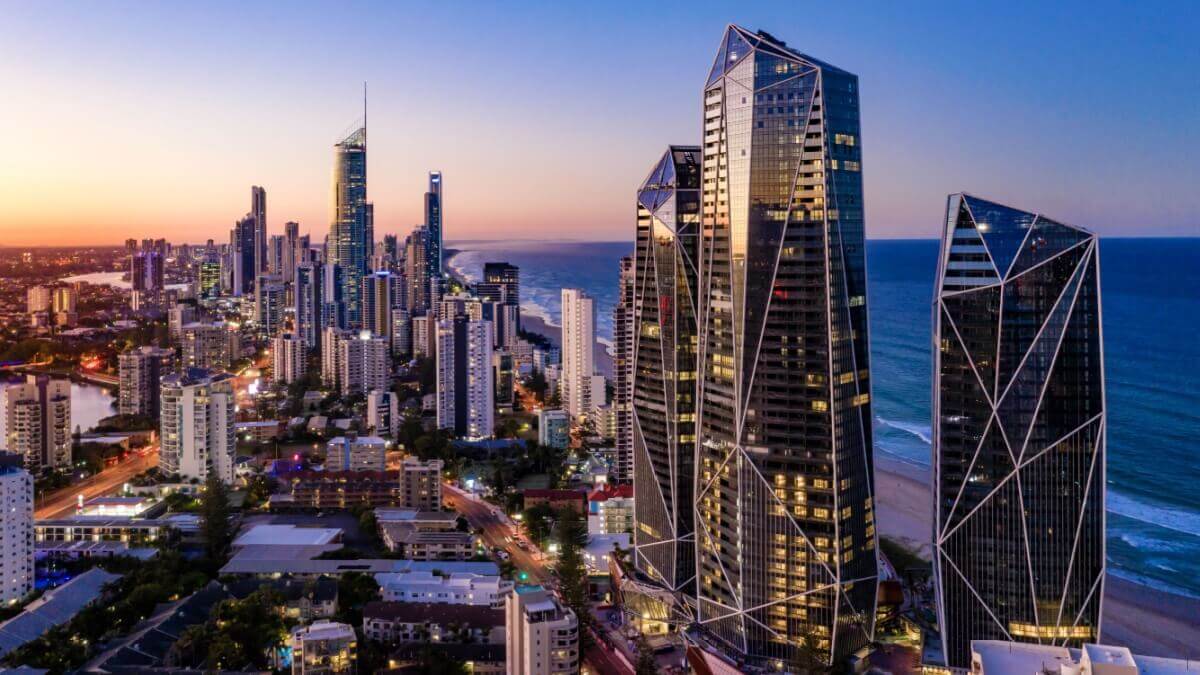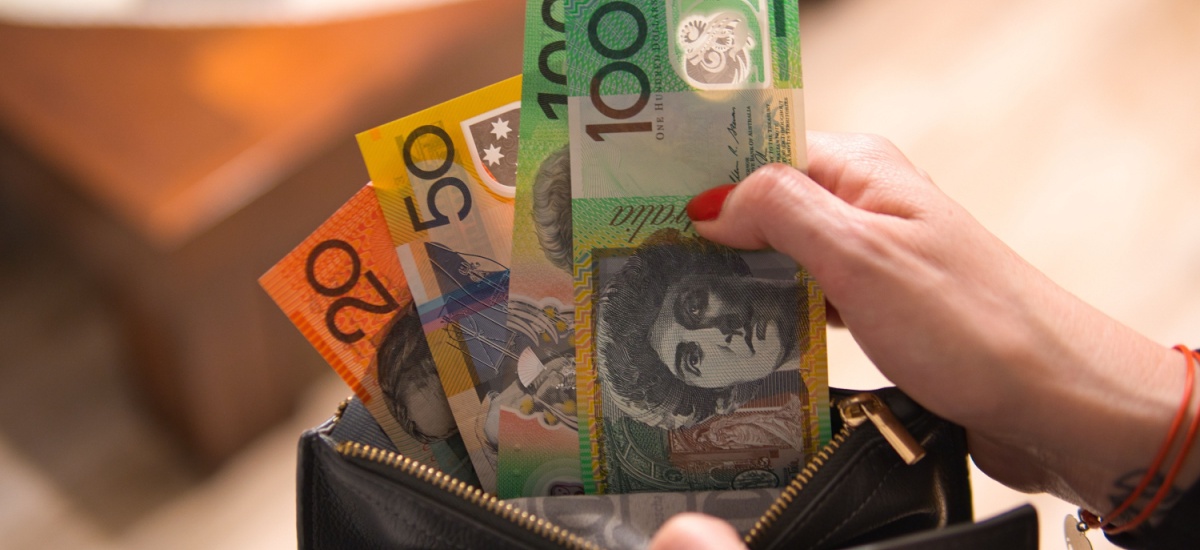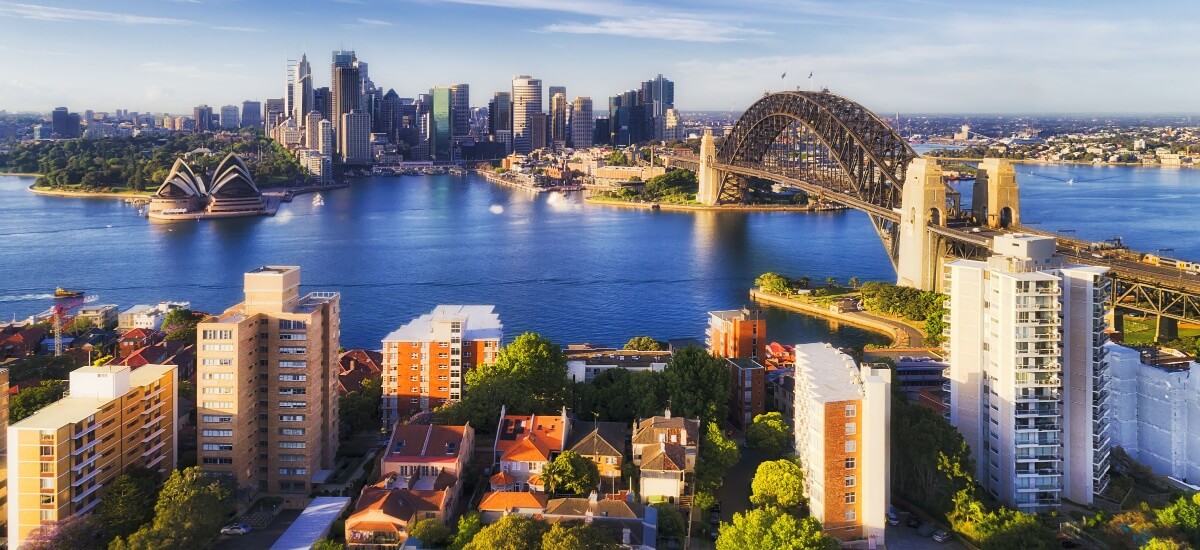How income tax in Australia works for foreigners (UK guide)
Find out how income tax in Australia works for foreigners in our handy guide for UK expats, overseas workers and digital nomads.

Thinking of moving to Australia from the UK, or buying a holiday home or investment property there?
Whether you’re drawn to the bright lights of Sydney, the country’s cultural capital of Melbourne or laid-back Perth, you’ll need to know all you can about how to buy property in Australia.
We’re here to help, with a complete guide to buying property in Australia as a foreigner. We’ll cover all of the essentials, including details of the buying process, the latest Aussie property prices and where to find your dream home.
If you’re looking for ways to save money on currency exchange when buying property in Australia, check out the money services provider Wise. You can send large transfers with Wise for low fees* and great exchange rates - making it ideal if you’re sending a secure international transfer.
Before you start house hunting, it can be useful to know a little about how the process of buying property works in Australia.
Here’s an overview of the steps involved:¹
The first thing to do is get your finances sorted. You’ll need to get pre-approval for a mortgage, and set your budget. You might want to open an Australian bank account, ready for transactions relating to your mortgage.
It’s also a good idea at this stage to create a list of criteria, so you know exactly what you’re looking for.
Now it’s time to start searching, using either online property portals or local estate agents (or both).
If you see something you like, arrange to view it as soon as possible so you don’t miss out. Many property viewings are done through open houses, which is where all interested buyers visit to inspect a property on the same day - without needing a specific appointment time.
A crucial thing you need to do at this stage is to apply for permission to buy property from Australia’s Foreign Investment Review Board (FIRB). This board sets out the rules for foreign investors as well as temporary residents wanting to buy property in the country. If you buy a home without FIRB approval, you could face a large fine or even prison time.²
We’ll look at how FIRB works and the eligibility criteria later in this guide.
Once you’ve found your dream home, you’ll need to make a competitive offer.
If it’s a private sale, you’ll submit this offer to the real estate agent or directly to the seller - negotiations on price are normal.
You can either submit a conditional or unconditional offer, the former being a binding commitment to buy providing certain conditions are met (such as a clean building survey or valuation report).
There’s also the option to buy at auction, where you’ll place bids on the property along with other interested parties.
If you’re buying a property at auction and your bid is successful, it’s likely that you’ll be asked to pay a deposit upfront. For private sales, the contract of sale will set out the deposit amount and when it needs to be paid. In many Australian states and territories, there’s at least a short cooling-off period.
It’s a good idea to appoint a legal expert to handle the paperwork involved in buying a property. One of the first things they’ll do is check over the contract of sale before you sign it.
It’s not mandatory, but it’s definitely a good idea to appoint a professional to carry out a building inspection.
This will flag up any potential structural, electrical or damp issues, as well as any necessary repairs or maintenance required. You should also get a pest inspection, to check for termite activity or other pest issues.
Once your offer is accepted, it’s time to let your mortgage provider know. They’ll give you some final paperwork to complete.
Your conveyancer, along with the lender and seller, will do the work required to finalise the settlement. This is the transfer of the property title into your name.
A settlement date will be agreed, on which you’ll sign all documents and transfer the remaining balance.
And apart from settling fees and taxes (which we’ll look at shortly) this is the purchase complete. You’ll get the keys to your new home, and can settle into your new life in Australia.
| 💡 Read more: How to transfer large amounts of money from the UK? |
|---|
Australian banks and other lenders do offer mortgages to foreigners and non-residents, but the conditions and requirements may differ compared to applying as a local.
For example, some banks may ask for a 30% home loan deposit from foreign applicants - compared to the 20% usually asked. Interest rates may also be higher, and you may be asked for more paperwork.³
In order to apply for your mortgage, you’ll need to provide certain details and documents. The requirements will vary between banks, but generally you’ll need:⁴
It’s not just the agreed sale price you need to consider when budgeting for your Australian property purchase.
You also need to factor in the relevant fees and taxes for buying property in Australia.
Here are the essential costs you need to know about:⁵

The Australian property market is continuing its upward trajectory, with prices over the last year rising by 8.7%. The highest increases are in Brisbane, where house prices have shot up by 16% compared to the same time last year.⁷
Experts are predicting that property prices will keep increasing throughout 2024, and perhaps beyond.
As if this didn’t make the market challenging enough for buyers, there’s also an undersupply of properties.⁷ Australia is experiencing a housing shortage, meaning that demand is outstripping supply. This could make it difficult to find and secure your dream home.
Yes, foreigners can buy property in Australia, but only under certain conditions.
The most important of these is the need for foreign investors (non-resident) and temporary residents to get permission from the Foreign Investment Review Board (FIRB) before purchasing a property.
The FIRB oversees all foreign investment in Australia and legislates a strict set of rules that must be satisfied for a purchase to be approved. Approval from the Australian Taxation Office (ATO) may also be required in some cases.
You’ll need to apply to the FIRB, submit supporting documents and pay a hefty application fee. Find out more here on the ATO website.
No, you won’t automatically get permanent residency by buying a property in Australia. You’ll need to get the appropriate visa for that - read our guide to skills in demand visas in Australia.
However, owning a home could potentially pave the way for a citizenship application in the future.
Now we come to that all-important question - how much is property in Australia?
The cost of living in Australia is a touch higher than the UK, and it’s a similar story with property prices.
On average, you’ll pay nearly 12% more per square metre for an apartment in a city centre, and around 7.6% per square metre for the same property in a more rural area.⁸
And here’s a guide to what you can expect to pay per square metre in some of Australia’s major cities:⁹
| City | Average apartment price per sq.m - city centre | Average apartment price per sq.m - outside city |
|---|---|---|
| Sydney | 22,477 AUD | 14,159 AUD |
| Brisbane | 12,286 AUD | 8,551 AUD |
| Canberra | 11,113 AUD | 8,971 AUD |
| Melbourne | 10,928 AUD | 8,384 AUD |
| Adelaide | 9,902 AUD | 6,060 AUD |
| Perth | 8,216 AUD | 5,900 AUD |
Remember though that property prices will also vary depending on the type of property.
Another thing to note when figuring out the price for property in Australia is that international transfers could get expensive, especially if the provider adds a margin to the exchange rate to convert your pounds. Consider checking out Wise to handle your large transfers with mid-market exchange rates and low, transparent fees*.
| 💡 Read more: How to transfer large amounts of money from the UK? |
|---|
Of the major cities in Australia, Perth - with prices less than half of those in Sydney on average - is the cheapest.
If you’re property hunting on a budget, it could also be worth checking out Queensland and parts of Western Australia where prices may be lower.
There are a few ways you can find property to buy in Australia. The main routes are real estate agencies and online property websites.
It isn’t necessary to use a real estate agent to find a property to buy. But it can be helpful, especially if you’re moving to Australia from the UK and are unfamiliar with the local property market.
The real estate industry in Australia is heavily regulated, with all agents and agencies requiring formal licensing to operate.
This means you can confidently approach any licensed agency of your choosing for advice and assistance. You can also appoint a Buyer’s Agent to act on your behalf, although bear in mind that fees may apply for this service.
You can also search for property in Australia online, from the comfort of your current home in the UK.
To help you start your search, here are some of the most popular property websites for Australian real estate:

As we’ve mentioned, the Aussie property industry is strictly regulated - which should in theory make it safer to buy and sell property in Australia.
In particular, real estate agents need to adhere to strict codes of conduct and ethical standards. This means greater transparency in the purchasing process, more accurate information and a lower risk of fraudulent transactions.
But there are still some potential pitfalls and risks you should look out for, including the following:¹⁰
And of course, you should take all possible measures to protect yourself from scams and fraudsters.
The right property for you will all depend on what type of home you’re looking for and where you want to live. Some areas will be better suited to professionals and business owners, students or retirees than others. Your budget will also play a huge role in which property you choose.
If you’re not already living in Australia, it’s worth making a trip to check out the local area and view properties. Pay attention to local transport links and amenities, and try to get a feel for the area.
It’s crucial to do as much research as possible before committing to purchase a property.
One of the most important tasks is to get a full building survey and pest report carried out. It could flag up structural issues or the need for repairs, and could save you money down the line.
As you look forward to getting the keys to your new home, you’ll have a final few tasks to check off your list. These include taking out insurance, setting up your utilities and carrying out any energy efficiency renovations.
It’s a good idea to take out buildings insurance for your new property, starting from the settlement date. This may be a requirement by your mortgage lender too.
If you know when your completion date will be, it makes sense to get some essentials set up in advance of moving in.
A prime example is utilities, such as heating, power and water. Get these sorted as early as you can, and the moving process should be a little smoother.
If you’re buying an older property, you might find that it’s lacking on the energy efficiency side. This can push your bills up once you move in, and may also be impractical (and uncomfortable) for dealing with Australia’s often extreme climate.
So you might want to factor energy efficiency improvements into your overall budget.
And that’s it - a complete guide to buying property in Australia for foreigners. We’ve covered all the essentials, including where to find property and how the buying process works, along with fees, taxes and property prices.
After reading this, you should have a better grip on how it all works, and be ready to start house hunting.
And, if you want to save money while buying your new property in Australia, use the Wise account to send your international transfer. It’s not a bank account but offers many similar features.
Here are the main benefits for using Wise: |
|---|
|
Sources used:
Sources last checked on date: 06-Aug-2024
*Please see terms of use and product availability for your region or visit Wise fees and pricing for the most up to date pricing and fee information.
This publication is provided for general information purposes and does not constitute legal, tax or other professional advice from Wise Payments Limited or its subsidiaries and its affiliates, and it is not intended as a substitute for obtaining advice from a financial advisor or any other professional.
We make no representations, warranties or guarantees, whether expressed or implied, that the content in the publication is accurate, complete or up to date.

Find out how income tax in Australia works for foreigners in our handy guide for UK expats, overseas workers and digital nomads.

Can I keep my Australian bank account if I move abroad? Find out everything you need to know here in our handy guide.

Here’s what you need to know about private healthcare in Australia for expats. Learn about the best providers, costs and more.

Everything you need to know about Australia's new Skills in Demand visa which came into effect in December 2024.

Your essential guide to importing a car from Australia to the UK, covering the costs, documents and procedures to follow.

Everything you need to know about moving to Australia from the UK. Read about visas, healthcare, buying property, tips for retirees and more.